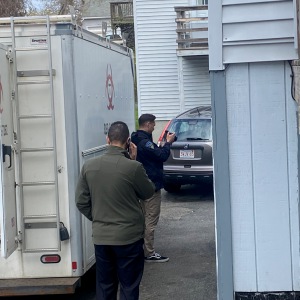Conway resident leading pilot program to help families facing financial ‘cliff effect’

HANNAH REUTER
|
Published: 04-15-2024 2:37 PM
Modified: 04-15-2024 2:47 PM |
CONWAY — Earning a raise or getting a promotion normally sounds like a great thing, but in the case of low-income workers across the country, it isn’t so simple, as increases in income can leave families ineligible for public assistance.
A pay increase at work can create a disproportionate loss of government assistance, known as the “cliff effect.” Even a small pay bump can cause people to lose access to benefits like subsidized food, housing and child care, with the change sometimes triggering even more challenging financial situations.
One Conway resident is battling this dilemma head-on.
“The benefits cliff is a systems problem, not a people problem,” said Hannah Reuter, director of the Cliff Effect Pilot Program, which is dedicated to creating policy solutions to the benefits cliff.
The three-year pilot program aims to help up to 100 residents and their families across Massachusetts who receive public assistance to obtain higher-paying jobs and careers via targeted cash assistance, one-on-one career advice, financial coaching and connecting workers with employer partners who offer living-wage employment opportunities. Participants will also be eligible for a $10,000 bonus upon completion of the program to help families maintain strong financial stability.
“My hope is that we can show people that we can create a safety net that is truly a transitional system,” Reuter said when asked what she hopes to accomplish with the pilot program. “It is there for those who need it when they need it, but it should not trap you and become the framework around which you make all your family and employment decisions.”
While the pilot program is intended to expand to help families in Boston and Worcester, work will be focused on Springfield for the time being, where Reuter believes it is needed the most.
“While the benefits cliff touches all parts of Massachusetts and the United States, I’d say this issue acutely effects Gateway Cities, where as many as 30-35% of the residents of those communities receive SNAP (Supplemental Nutrition Assistance Program) benefits depending on the city,” Reuter said. “In western Mass, I think there is a burgeoning understanding that getting folks into that first $15 or $16 an hour job is not enough to put someone on a path to economic mobility.”
Article continues after...
Yesterday's Most Read Articles
 Authorities ID victim in Greenfield slaying
Authorities ID victim in Greenfield slaying
 State records show Northfield EMS chief’s paramedic license suspended over failure to transport infant
State records show Northfield EMS chief’s paramedic license suspended over failure to transport infant
 Police report details grisly crime scene in Greenfield
Police report details grisly crime scene in Greenfield
 On The Ridge with Joe Judd: What time should you turkey hunt?
On The Ridge with Joe Judd: What time should you turkey hunt?
 ‘I have found great happiness’: The Rev. Timothy Campoli marks 50 years as Catholic priest
‘I have found great happiness’: The Rev. Timothy Campoli marks 50 years as Catholic priest
 Formed 25,000 years ago, Millers River a historic ‘jewel’
Formed 25,000 years ago, Millers River a historic ‘jewel’
After years of advocacy, the program received $1 million through the Legislature in 2022 with support from Springfield WORKS, the WesternMass Economic Development Council and the Food Bank of Western Massachusetts. In 2021, Springfield WORKS co-founded the Economic Pathways Coalition with the goal of getting the Cliff Effect Pilot Program passed through the 2022 economic development bill. The group has grown to consist of more than 150 members, including working families, state and local leaders, employers, anti-hunger advocates, philanthropic organizations and service providers.
According to Reuter, though, the funding received from the Legislature in 2022 doesn’t cover the total costs to support all 100 families.
“We are working to secure additional financial support from the Legislature and philanthropy, but as we know, the state budget is in a difficult position this year and it takes time to build relationships with funders,” she said. “As a result, we’ll start with a small initial cohort and as we continue to raise additional funds, we will expand the number of families we serve.”
On Tuesday, April 2, Springfield WORKS hosted a legislative briefing at the State House in Boston to highlight the urgent need for continued support in tackling the benefits cliff. Individuals facing cliff effects were at the forefront of the event, who Reuter described as people doing everything right — working multiple jobs, seeking stable housing and playing by the rules.
“They are stuck,” she said. “I think the consensus among many in the commonwealth is that this does not make sense and it’s time for change. So, I’m optimistic we’ll see increased support for our work.”
The direct cash “bridge” payments, job training and financial coaching are evaluated to determine the best way to help individuals pursue higher income while transitioning from reliance on public benefits and saving taxpayer money.
“We believe our pilot will disrupt intergenerational poverty by providing the resources necessary to attain higher-wage employment and ultimately save the state money as families decrease their reliance on public benefits,” Reuter said.
Reuter graduated from the University of Massachusetts Amherst in 2012 with a degree in political science and earned a master’s degree in public administration from New York University’s Wagner Graduate School of Public Service, launching her on a career path dedicated to improving policies and programs that combat poverty. Starting her career as an AmeriCorps member in Portland, Oregon, she helped manage a weekend food program for food-insecure elementary school students. Before her appointment as director of the Cliff Effect Pilot Program, she served as a policy manager at the Abdul Latif Jameel Poverty Action Lab North America. Her experience with various research and policy organizations led her to her battle against the cliff effect.
She is hoping the results of the pilot program’s evaluation will illustrate the need for changes to how safety net programs are administered and inspire policy recommendations to tackle the cliff effect.
“Our hope is really for permanent policy change, rather than seeing this exact model scaled up across the whole state,” Reuter explained. “We’re using this as an opportunity to show folks what is possible when we create the conditions for a worker to advance — how it improves their financial well-being and the well-being of their families.”
For more information on the Cliff Effect Pilot Program, visit the Springfield WORKS website at springfieldworks.net/our-work/cliff-effect-pilot.

 Franklin Tech student welds artistic bench for French King Bridge
Franklin Tech student welds artistic bench for French King Bridge Wendell voters to decide on battery storage bylaw
Wendell voters to decide on battery storage bylaw What are the protocols for emergency transport of infants?
What are the protocols for emergency transport of infants?
